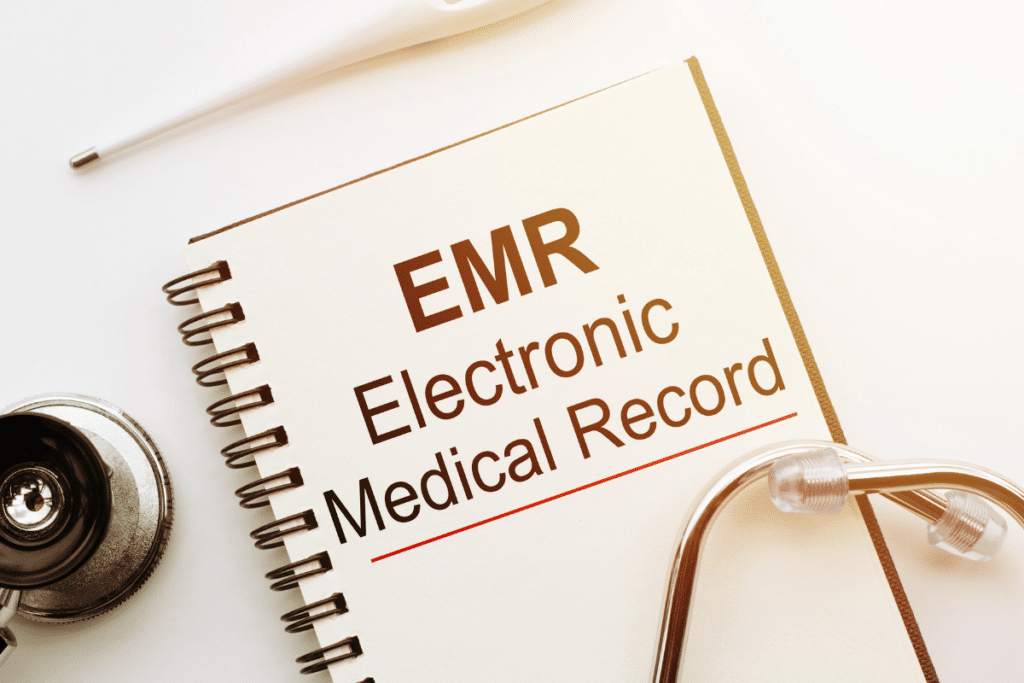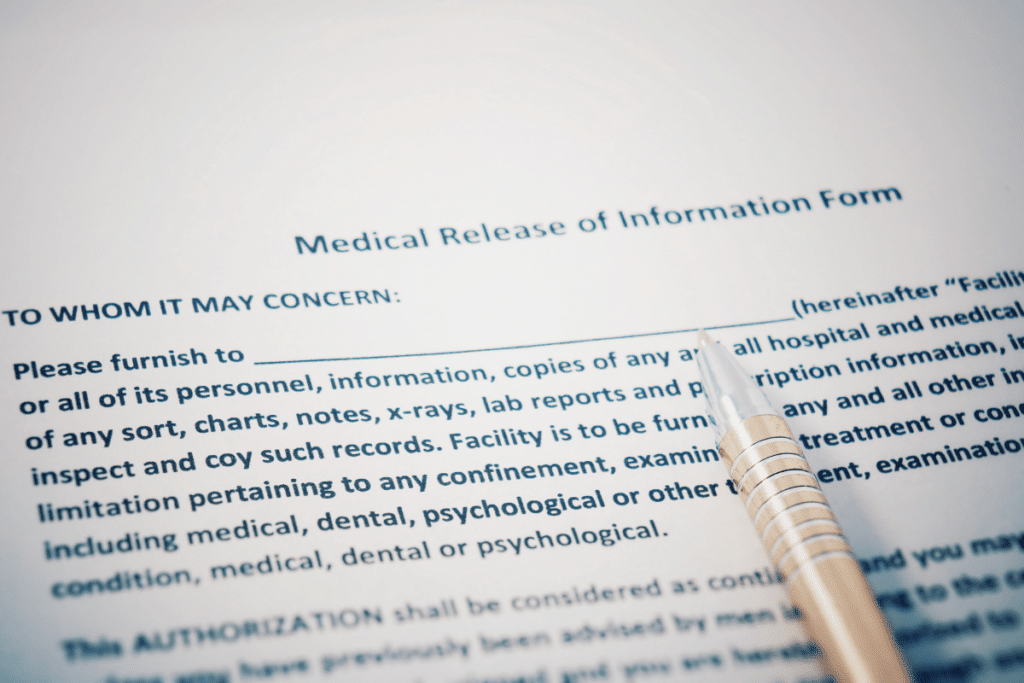Countless records, files, and documents are necessary to support claims in legal proceedings, but how does one go about tracking them down?
The act of locating relevant records, working with facilities to obtain them, and extracting any relevant information can be a laborious and time-consuming process. That’s why many individuals, businesses, and legal professionals seek to streamline these tasks by outsourcing them to a third-party records retrieval service.
At Bosco Legal Inc., we have over 30 years of experience in record retrieval, specializing in medical records. We’ll share some of that expertise by laying out what the medical record retrieval process looks like, as well as considerations, key challenges, and any legal implications for court admissibility.
What is Records Retrieval?
Records retrieval is the process of obtaining existing documents that become relevant to legal proceedings.
Commonly, these records are buried in the depths of robust digital record systems or stowed away in long-forgotten filing cabinets. To locate and secure the necessary files, it may require days, weeks, or even months of back and forth with facilities and their representatives. Plus, there are additional complexities posed by both state and federal laws, as well as corporate processes for records release.
While time and resources are finite, retrieving records has the potential to put a burden on both. The right mix of skills, technology, and experience is paramount to efficiency.
What is Record Extraction?
Once the relevant records are secured, further resources are required to pinpoint relevant information, which could be small snippets scattered throughout large documents. The process of identifying the relevant data from any records obtained is known as extraction.
A record retrieval service with paralegals on staff can assist with data extraction, leveraging litigatory expertise to pinpoint the most powerful data.
What is Medical Record Extraction?
Medical record extraction is the act of finding information that best supports a claim in a legal matter which hinges on the extent of an individual’s illness or injury. For example, an insurance company may seek records to determine whether there are discrepancies between a party’s claims of injury and medical records of the injury.
There are likely certain pieces of information that are most relevant to potentially fraudulent behavior. These data points require extraction from the records retrieved, as they are likely just one small piece of a large set of information.
What Types of Records Are Retrievable?
Records that become relevant to a court case or other legal proceeding can take virtually any form, depending on the unique nuances of the matter. However, certain types of records are more commonly requested, including court, financial, business, and medical records. Each comes with its nuances, including laws and policies concerning the release of the documents.
The large brunt of the records retrieval industry is focused on medical records, which tend to make up the large majority of our requests at Bosco Legal.
Medical Records
Electronic records have been around since the 1960s, but it wasn’t until more recently that they were adopted at scale across medical facilities and institutions.
Though records are now digital, expanded modern functionality doesn’t mean that obtaining them is as instantaneous as sending an email or visiting a portal. Much like with physical record retrieval, success is contingent on knowing how to retrieve medical records with the least time and friction. It’s a matter of knowing how to navigate the process, collaborate with facilities, and use the legal rights available.
Why Are Patient Records Retrieved?
Medical record retrieval for law firms, insurance companies, and clients is most often required as part of a medical background investigation in conjunction with personal injury, medical malpractice, or workers’ compensation fraud. In these types of cases, a party is seeking compensation for an injury, illness, or accident. The record retrieval company will work as an agent of the law firm representing either party in the case, or in some cases, directly with the client.
What Are Examples of Data In a Medical Record?
An Electronic Health Record (EHR) – also known as an Electronic Medical Record (EMR) – contains all of the information that is relevant to a patient across the healthcare providers they see. The components of an EHR include both medical documentation and administrative data:
- Medical histories
- Diagnoses
- Medications
- Immunization dates
- Allergies
- Radiology images
- Lab and test results
- Administrative and billing data
- Patient demographics
- Progress notes
- Vital signs
Who Are the Two Types of People Who Can Retrieve Medical Records?
Patient medical records are private and protected from viewing without the consent of the patient. Thus, only a patient or an agent for whom the client has signed a release authorization can retrieve and view them.
Many patient rights concerning viewing and obtaining medical records – as well as the secure digital storage of said records – are encoded in The Health Insurance Portability & Accountability Act (HIPAA) and Confidentiality of Medical Information Act (CMIA). These laws protect the privacy of medical records and establish a right to request or review your records.
State law also plays into the equation, as each state maintains its own policies regarding who can view medical records and when they are admissible in court. For example, the right of a patient to see and receive copies of their medical records is established in the California Health & Safety Code section 123100 et seq.
Generally speaking, there are two ways protected information becomes available in a court proceedings through medical record retrieval for litigation. Either of the following are crucial for HIPAA compliance:
- The patient signs a Release of Information Authorization for a lawyer or judge.
- A subpoena or court order is issued requesting the release of medical records.
Are Medical Records Admissible in Court?
To understand whether medical records are admissible in court, it’s vital to know how they relate to the concept of hearsay.
Hearsay states that someone can not testify as to the truth of what someone else said — only that they said it. To verify the truth of the statements and have them considered by a jury, it would require testimony by the person who said or wrote the statement or witnesses who were present.
Since medical records are governed by the hearsay rule, the same applies: they would require testimony from medical professionals present at the time of the documentation for admissibility. However, there are exceptions to this rule that attorneys use to make medical records admissible in court.
The most common is the business records exemption. In California, writings that record an act, event, or condition is admissible under the business records exception if it occurs in the ordinary course of business. The stipulations for using this exemption can be found in Evidence Code §1561, one of which is the need for an affidavit by the representative of the facility in charge of the records.
What Is the Process for Record Retrieval?
If the need arises to work with a record retrieval company to secure relevant medical records, we’re available to obtain the necessary documents, validate their authenticity and accuracy, and guide clients through the process. While the medical record retrieval service methodology can vary based on the facility, legal proceedings, and other variables, you can expect the following steps within the workflow:
- Patient Initiation – The patient or an authorized agent will directly request the retrieval of medical records.
- HIPAA-Compliant Authorization – The client will fill out the necessary authorization form(s) stating their records can be released, or the attorney will seek a subpoena or court order for the release of the documents.
- Contact Medical Facility – A medical record request is submitted or subpoena served to the relevant facilities. It might be necessary to contact multiple offices or even organizations to locate the records.
- Follow-Up With Facility – A follow-up is made to confirm receipt once the request is submitted. The facility is contacted regularly to inquire about the status of the records requested.
- Quality Control – Upon receiving copies of the records, they pass through multiple levels of validation and quality control to ensure that they are accurate and legible. Based on this review, it might be necessary to get in touch with the facility for further information or clarification.
- Delivery – After passing quality control, the records go through a stringent photocopy process and are delivered securely via a password-protected digital download.
You Don’t Have to Navigate the Medical Record Retrieval Process Alone
At Bosco Legal., we pride ourselves on providing a best-in-class experience tailored to the nuances of client needs. Our experts are available to track down and obtain relevant medical documentation, leveraging our industry-leading team for the least possible turnaround time.
Save time, resources, and unnecessary hassle by calling us for record retrieval solutions. Give us a phone call today at (877) 353-8281 to schedule an appointment. You can also send us a message online.







